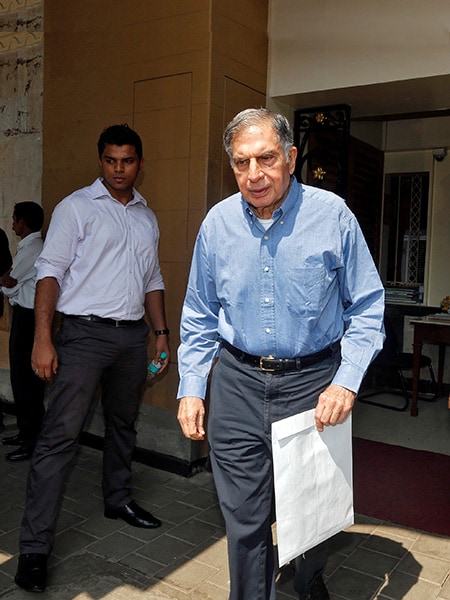
Tata hits back at Cyrus Mistry as war of words turns bitter
Meanwhile stocks of Tata Group companies continue to lose value, with Rs44,000 crore of shareholder wealth eroded in three days
The war of words between Cyrus Mistry and the Tata Group, of which he was chairman till recently, escalated further on Thursday with the conglomerate responding to Mistry’s strongly-worded letter to Tata Sons’ board of directors. The said letter caused a stir with allegations of lax corporate governance norms at the storied business house.
Responding to a confidential letter written by Mistry on October 25 to the board of Tata Sons – the flagship holding company of the salt-to-software conglomerate – and trustees of the charitable trusts that own a majority shareholding in the company, the group termed Mistry’s allegations as “malicious” and claims as “unsubstantiated.”
“Mr. Cyrus Mistry has been on the board of the company since 2006. He was appointed deputy chairman in November 2011, and formally appointed chairman of Tata Sons on December 28, 2012. He would be fully familiar with the culture, ethos, governance structure, financial and operational imperatives of the Tata Group as well as various group companies,” a statement by the Tata Group issued on Thursday said. “As the executive chairman, he was fully empowered to lead the group and its companies. It is unfortunate that it is only on his removal that allegations and misrepresentation of facts are being made about business decisions that the former chairman (Mistry) was party to for over a decade in different capacities. The record, as and when made public, will prove things to the contrary.”
After ousting Mistry as chairman on October 24, the conglomerate brought his predecessor, Ratan Tata back as interim chairman for a period of four months, in which time a selection committee is expected to appoint a new executive chairman.
In the letter, which found its way to media outlets the next day, Mistry described himself as a “lame duck chairman,” whose authority as the head of the $103 billion-conglomerate was severely curtailed by the shareholders of Tata Sons. This, Mistry contended, hamstrung his ability to engineer a turnaround at various group companies such as Tata Steel, Tata Motors and Indian Hotel Co. Ltd (IHCL) that have been facing headwinds for the past few years.
Mistry’s missive also points towards various instances of allegedly weak corporate governance norms at the business house. These examples included the acquisition of the Searock Hotel in Mumbai by IHCL at “a highly inflated price,” which was “housed in an off-balance sheet structure;” and loans disbursed by Tata Capital to ventures promoted by C Sivasankaran at the alleged behest of R Venkatramanan, managing trustee of Sir Dorabji Tata Trust, which have since turned bad.
The son of Pallonji Mistry, who is the single largest individual shareholder in Tata Sons with an 18.4 percent stake, also said that before 2013, Tata Motors’ financial services arm extended credit to borrowers with “lax risk assessment” to shore up sales of its vehicles and market share. He also pointed towards a recent forensic investigation that revealed fraudulent transactions of Rs22 crore pertaining to AirAsia India, involving non-existent parties in India and Singapore. Mistry alleged that one of the reasons why Tata Motors’ small car project, Nano was kept going, despite being loss-making, was due to “emotional reasons,” and the fact that Nano gliders were used by an entity that makes electric cars in which Ratan Tata had a stake.
Ratan Tata’s investee company in question, Ampere Technologies, has since clarified that Nano gliders (a vehicle without a powertrain) weren’t being supplied to it.
“Efforts are now being made to level accusations against individuals and company boards for ignoring corporate governance norms that were supposedly upheld by the former chairman while in office,” the Tata Group said. “The Tata Sons board gives its chairman complete autonomy to manage opportunities and challenges. However, the tenure of the former chairman was marked by repeated departures from the culture and ethos of the group.”
The statement didn’t specify how Mistry deviated from the conglomerate’s culture and ethos.
To be sure, these allegations leveled by Mistry haven’t been proved yet. But they have been surely noticed. On Wednesday BSE and NSE asked Tata Group companies for clarifications in connection with Mistry’s contention that a clutch of group firms were faced with a possible write-down of Rs1.18 lakh crore. The Press Trust of India (PTI) also reported that market watchdog Sebi was keeping a close eye on the developments unfolding at the conglomerate and will look into any possible breach of corporate governance. PTI also reported that the civil aviation ministry had taken a note of Mistry’ allegation pertaining AirAsia and the former will take action if needed. Simultaneously, the Federation of Indian Airlines moved the Supreme Court on Thursday challenging the grant of aviation permit to the Tata Sons-AirAsia joint venture in India.
“It will be beneath the dignity of Tata Sons to engage in a public spat with regard to the several unfounded allegations appearing in his leaked confidential statement,” the group said. “These allegations are not based on facts or the true state of affairs. It is convenient to put selective information in the public domain to defend one's point of view.”
Meanwhile confusion reigns supreme in the minds of investors. The market value of Tata Group firms has continued to lose ground since news of the dismissal of its chairman broke out and ensuing developments unfolded. Shareholders of the conglomerate’s 21 listed companies lost a combined wealth of Rs44,000 crore in the three days between October 24 and October 27.





